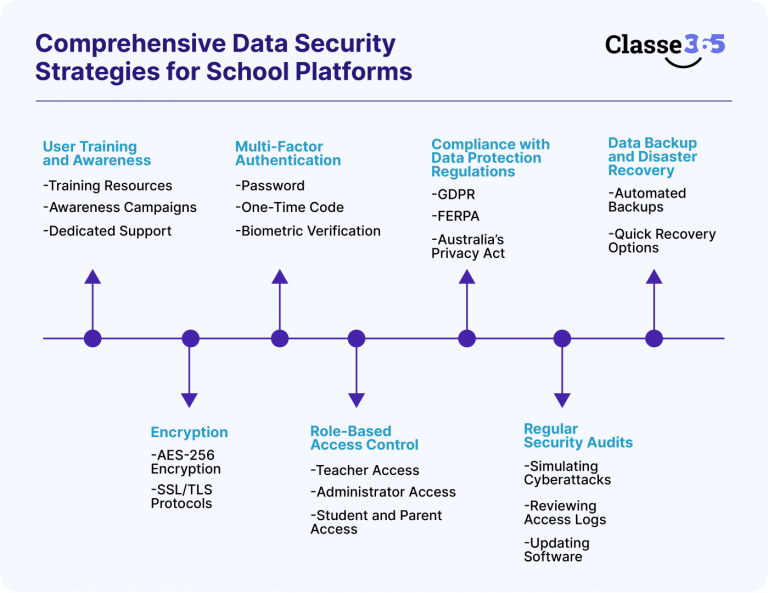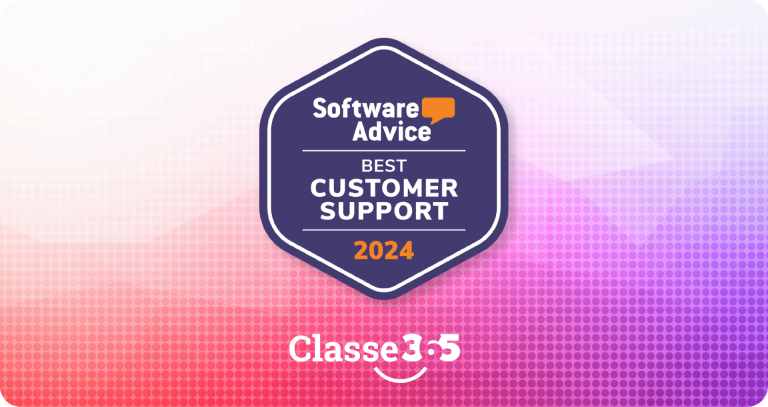In today’s digital age, schools, and educational institutions rely more than ever on technology to keep things running smoothly. From managing operations to tracking student progress and facilitating learning, tech plays a massive role. But with this reliance comes a big responsibility—keeping student data safe.
A recent PowerSchool data breach has exposed 50 million people’s data from 1985 to 2024. The incident has run a shockwave across educational institutions and districts. Schools collect a lot of sensitive information, from personal details to academic records. If that data falls into the wrong hands, the consequences could be serious for students and the institution.
Correct Approach to Data Security
Data security is an ongoing process. Any school management platform that you’re relying on must organize an annual data screening process. Regular data storage and maintenance are crucial.

Encryption: Protecting Data at Rest and in Transit
Encryption is one of the most effective ways to protect sensitive information. Classe365 employs:
- AES-256 Encryption: Data stored in the system is encrypted using the Advanced Encryption Standard (AES-256), one of the most secure encryption methods available.
- SSL/TLS Protocols: Data transmitted between users and Classe365 servers is encrypted using Secure Sockets Layer (SSL) and Transport Layer Security (TLS) protocols. This ensures that information remains protected from interception during transmission.
Multi-Factor Authentication (MFA): Strengthening Access Control
Multi-factor authentication ensures that only authorized individuals can access the platform. This security feature requires users to provide two or more verification factors, such as:
- A password
- A one-time code was sent to their mobile device
- Biometric verification, such as fingerprint or facial recognition
MFA minimizes the risk of unauthorized access by requiring multiple layers of authentication.
Role-Based Access Control (RBAC): Limiting Data Exposure
Role-Based Access Control (RBAC) ensures that users can only access the information relevant to their roles. For example:
- Teachers can view academic records but cannot access financial data.
- Administrators have broader access but are restricted from medical records unless necessary.
- Students and parents can only view their specific information.
This granular level of control reduces the risk of data exposure and ensures compliance with privacy regulations.
Regular Security Audits and Penetration Testing
As mentioned earlier, conducting regular security audits and penetration testing to identify and address potential vulnerabilities is crucial. These proactive measures include:
- Simulating cyberattacks to test system defenses
- Reviewing access logs to detect suspicious activity
- Updating software and patches to mitigate known vulnerabilities
You have all right to ask your school management software whether it conducts such audits and regularly works on improving its security infrastructure.
Data Backup and Disaster Recovery
The system should provide your institution with robust data backup and disaster recovery solutions to safeguard against data loss due to cyberattacks, hardware failures, or natural disasters. The system must be equipped with:
- Automated Backups: Data is backed up regularly and stored in multiple secure locations.
- Quick Recovery Options: In case of data loss, the platform allows for rapid restoration to minimize downtime and disruption.
These measures ensure that critical student data is never lost, no matter the circumstances.
Compliance with Data Protection Regulations
The global data protection laws include:
- General Data Protection Regulation (GDPR): Ensuring the privacy and security of data for European Union-based institutions.
- Family Educational Rights and Privacy Act (FERPA): Protecting the privacy of student education records in the United States.
- Australia’s Privacy Act: Adhering to principles of transparency and accountability for Australian schools.
By aligning with these regulations, a platform ensures that schools can meet their legal obligations while maintaining trust with students and parents. As a global platform functioning in 130+ countries, Classe365 abides by all these data protection regulations. Here is a detailed map for you.
User Training and Awareness
Technology alone cannot guarantee data security—it requires an informed user base. Therefore trust a platform with customer support that you can turn to at any time:

- Training Resources: Guides and tutorials to help users understand best practices for data security.
- Awareness Campaigns: Regular updates on emerging threats and how to mitigate them.
- Dedicated Support: A responsive support team is available to address user concerns and queries.
Empowering users with knowledge reduces the likelihood of human errors leading to data breaches.
By choosing trusted platforms for data protection, educational institutions can also complement their defenses by applying comprehensive security solutions on their endpoints. Utilizing strong antivirus software, such as Bitdefender – Free Antivirus for Windows, ensures the safeguarding of student devices against a range of digital attacks. It actively identifies and neutralizes threats like viruses, ransomware, and other e-threats that pose risks to both students and organizations.
Protecting student data is a critical responsibility for schools and educational institutions. With cyber threats becoming more sophisticated, relying on a trusted platform can make all the difference.
By choosing a safe platform, schools can focus on what truly matters—delivering quality education—while knowing that their data is in safe hands. Choose the peace of mind that your institution needs.
Investing in a secure, reliable, and compliant platform is no longer a luxury—it’s a necessity. With Classe365, schools can confidently navigate the digital age, knowing that student data is protected with top-notch security measures. Start your free trial now.
